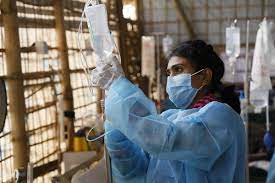Last week the WHO presented a special issue for Health Systems & Reform on “Common Goods for Health” – services that have a significant impact on health and a clear economic reason for funding if not provided jointly. However, unless disaster strikes, we often do not invest a little in this General Health Equipment — things like environmental management, epidemiology monitoring, disaster preparedness, reducing the incidence of antimicrobial infections, safer roads, and sanitation.
The article analyzes this small investment in Common Goods for Health, highlighting issues such as joint agency problems, foreign affairs, and free rides, as well as temporary thinking and risk reduction. You cannot open a newsletter without learning about the common failures of Common Goods for Health. Occasional epidemics such as SARs and Ebola have recently raised alarms about vulnerabilities in global epidemic surveillance systems and responses. Interest and investment are high — for a while — and then some of the most important short-term priorities are political. The cost of the opportunity to take action became more apparent than the threat.
With so many barriers to providing these essential services, it is appropriate to ask why countries produce Ordinary Health Goods at all? How do countries get to the point where they are willing to pay their taxes in order to invest in services that benefit the community? Invisible services when operating; and are they seen only when disasters intended to prevent them occur?
General Health Goods:
a brief history
History shows us that until the middle of the 20th century, many decisions to produce General Health Goods were not motivated by public interest. Instead, they were motivated by the interests of the elite. For centuries, the aristocracy considered the education of many to be a threat. It was only in the 19th century that nobles promoted the education of the masses after seeing it as a tool for nation-building and strong armies. The origins of the Universal Health Coverage (UHC) – discussed at UN meetings this week – are also linked to higher interest rates. Bismarck’s public health insurance program is widely regarded as the first step for any country heading to the UHC but was created to quell social unrest and unite unions.
From the 1950s onward, however, a completely different concept emerged: the idea that governments should solve joint problems for the benefit of society. If fully adopted, this concept is closely linked to adequate investment in General Health Assets. But we are well aware that getting action through these services and policies requires more than just urging friendly countries to do the right thing. It is a political process.
And as a political process there seem to be three important aspects related to identity, intelligence, and interests.
How to Obtain Goods
Ownership is important because it describes the “community” in which the Common Health Goods are produced … and we know that ownership is built on the community. The people we consider to be part of “us” and who are willing to sacrifice for their sake have changed in human history from families and homes to villages and great cities, kingdoms, and nations. A Sri Lankan study in a special issue mentions “Days of Peace” in which those who fought in a brutal civil war stopped fighting to allow vaccination campaigns to take place. Both sides considered the children to be important enough — the same responsibility — to comply with the temporary ban. On the contrary, we can see what happens when this combined information is lacking in how Congolese groups are using the Ebola crisis to gain power over their opponents. These extremes show that building a sense of cohesive ownership is needed at the national and international level if we are to produce the Common Health Goods we need.
Wisdom is indispensable because humans often do not solve problems until they face problems, such as cholera, natural disasters, political upheavals, and wars. When those in power encounter a problem that they cannot ignore, they invest in solving it. It is sad to learn that the establishment of the US Centers for Disease Control did not stimulate public interest in the employment of domestic infectious diseases. Instead, it was a sensitivity to government officials that the threat posed by biowarfare against American troops during the Korean War lasted a day. Many environmental management practices since the 1970s have been encouraged by the appearance of non-swimming rivers, smoldering smoke, or debris on beaches. Investments in vaccines and Ebola surveillance are increasing exponentially as a result of the epidemic in West Africa.
Interest is important because even though most countries today are democratic, we know that political and economic leaders still have the power to drive or block change. India shows both sides of this cycle. The coordination of disaster relief ministers has made remarkable progress in India, it seems, in part, because it is more expensive and does not directly conflict with economic interests. In contrast, tackling a major air pollution problem in major Indian cities requires significant economic change. The big question is whether Indian dignitaries will view air pollution as a major threat to their interests than the immediate economic costs.
We have always known that we need to work together to solve our problems. That really was the wisdom of establishing a UN system from the very beginning. It was after the Montreal Protocol to deal with the depletion of the ozone layer. Nowadays, however, the desire for cooperation seems to be fading.
However, there is a way forward. We actually have solutions for epidemics, antimicrobials, air pollution, and even climate change. However, using such remedies, however, is not the answer.

